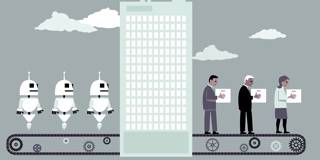Most of the reading public will have encountered scholarly predictions about the "future of work," and yet the most important elements of the debate lie in the past. As three recent books by leading economists show, understanding the history of technological change is crucial for anticipating what it will mean for employment in the decades ahead.
- Richard Baldwin, The Globotics Upheaval: Globalization, Robotics, and the Future of Work, Oxford University Press, 2019.
David G. Blanchflower, Not Working: Where Have All The Good Jobs Gone?, Princeton University Press, 2019.
Carl Benedikt Frey, The Technology Trap: Capital, Labor, and Power in the Age of Automation, Princeton University Press, 2019.
OXFORD – Work! It consumes much of our lives and energy. But how we work and what we get from it have changed dramatically over time, and, as all three books under review here show, further radical shifts are on the horizon. As is to be expected of books about the future of work in the twenty-first century, there are common themes – automation, globalization, inequality. But each also brings something original to the table.
Dartmouth’s David G. Blanchflower, the author of Not Working, has enjoyed a long career as a labor economist, during which he has resisted both the neoliberal assault on the welfare state and the austerity hawks’ obsession with fiscal ratios and alleged inflation threats. He is a firm believer that economists should pursue a pragmatic investigation of the actual state of the economy, rather than simply taking orders from possibly outdated models.
When it comes to assessing economic prospects, Blanchflower insists that we pay more attention to real-world signals, including employer, consumer, and household surveys. He often refers to indicators such as the optimism of taxi drivers or the intuitions of business managers, and recommends watching even more esoteric indicators, such as the frequency of cosmetic surgery procedures. A drop in facelifts, he suggests, may herald the onset of a recession.

David G. Blanchflower, Not Working: Where Have All The Good Jobs Gone?, Princeton University Press, 2019.
Carl Benedikt Frey, The Technology Trap: Capital, Labor, and Power in the Age of Automation, Princeton University Press, 2019.
OXFORD – Work! It consumes much of our lives and energy. But how we work and what we get from it have changed dramatically over time, and, as all three books under review here show, further radical shifts are on the horizon. As is to be expected of books about the future of work in the twenty-first century, there are common themes – automation, globalization, inequality. But each also brings something original to the table.
Dartmouth’s David G. Blanchflower, the author of Not Working, has enjoyed a long career as a labor economist, during which he has resisted both the neoliberal assault on the welfare state and the austerity hawks’ obsession with fiscal ratios and alleged inflation threats. He is a firm believer that economists should pursue a pragmatic investigation of the actual state of the economy, rather than simply taking orders from possibly outdated models.
When it comes to assessing economic prospects, Blanchflower insists that we pay more attention to real-world signals, including employer, consumer, and household surveys. He often refers to indicators such as the optimism of taxi drivers or the intuitions of business managers, and recommends watching even more esoteric indicators, such as the frequency of cosmetic surgery procedures. A drop in facelifts, he suggests, may herald the onset of a recession.